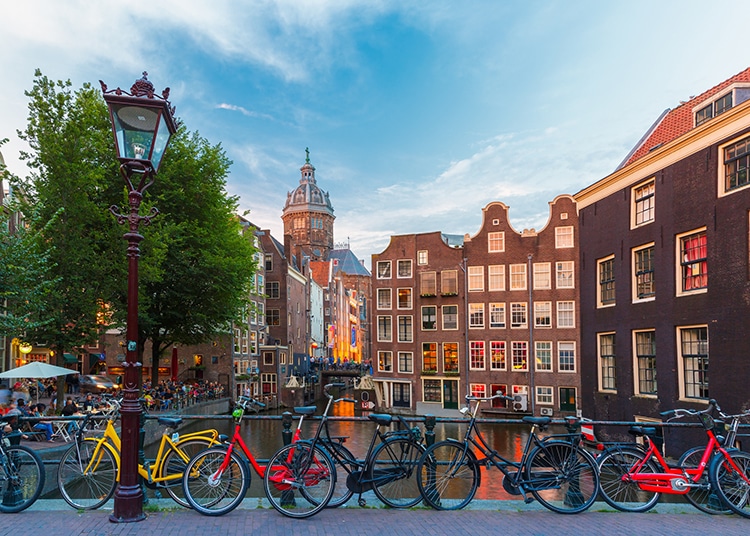
Amsterdam is a city of bikers. (Photo: OLGACOV/Depositphotos)
The city of Amsterdam is known for many things, one of which is its vibrant biking culture. In general, the Dutch are known to be cycling people in their everyday lives, with children in tow and baskets for errands. A new study by researchers at the University of Southern Denmark, which was published in Communications Earth and Environment, suggests that if everyone in the world biked as the Dutch do, global carbon emissions would plummet by a whopping 756 million U.S. tons (686 metric tonnes).
People in the Netherlands cycle an average of 1.6 miles (2.6 kilometers) per day. While Amsterdam and other Dutch towns may have more biking infrastructure than other global cities, many of the errands in the U.S. and elsewhere are also as achievable by bike. The climate organization Hubbub found that 50% of our daily journeys are less than two miles long. Bikes are a carbon-free option that would also encourage a healthy lifestyle which can prevent disease.
Globally, transport is a massive carbon producer. The sector clocks in at one-quarter of global production, one-half of that amount stemming from private vehicles. The researchers behind the new study found that by biking the same distances the Dutch do, 756 million U.S. tons of carbon emissions could be saved annually. This is larger than the carbon emissions of the entire countries of the UK, Canada, and countless others respectively.
“Lessons learned from successful experiences in countries like Denmark and the Netherlands, particularly on the city level such as Copenhagen and Amsterdam, would be essential,” the authors write. “These include but are not limited to, for example, proper bicycle lanes planning and construction, pro-bicycle education and culture, and policies to discourage car use through tax.”
If everyone in the world cycled as much in their daily life as the Dutch do, global emissions would plummet by 756 million tons.

The Dutch are industrious bikers, even with their children in tow. (Photo: ALENMAX/Depositphotos)
h/t: [Euronews]
Related Articles:
Art History: Ancient Practice of Textile Art and How It Continues to Reinvent Itself
Sister Duo Weaves Textured Wall Hangings Inspired by Australian Landscapes
How to Crochet: Learn the Basics of This Time Honored Handicraft
Artist Fills Forest with Life-Size Sculptures Made from Woven Rods of Willow
